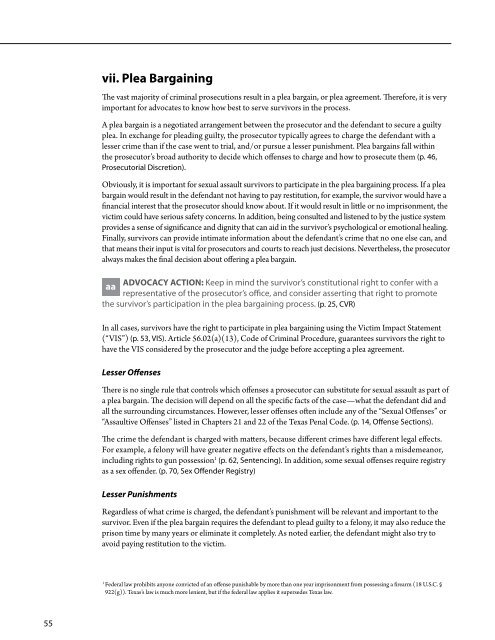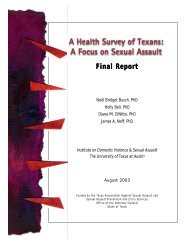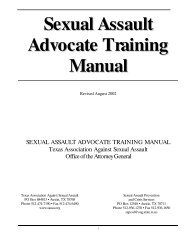Sexual aSSault LEGAL ADVOCACY MANUAL - Texas Association ...
Sexual aSSault LEGAL ADVOCACY MANUAL - Texas Association ...
Sexual aSSault LEGAL ADVOCACY MANUAL - Texas Association ...
You also want an ePaper? Increase the reach of your titles
YUMPU automatically turns print PDFs into web optimized ePapers that Google loves.
vii. Plea Bargaining<br />
The vast majority of criminal prosecutions result in a plea bargain, or plea agreement. Therefore, it is very<br />
important for advocates to know how best to serve survivors in the process.<br />
A plea bargain is a negotiated arrangement between the prosecutor and the defendant to secure a guilty<br />
plea. In exchange for pleading guilty, the prosecutor typically agrees to charge the defendant with a<br />
lesser crime than if the case went to trial, and/or pursue a lesser punishment. Plea bargains fall within<br />
the prosecutor’s broad authority to decide which offenses to charge and how to prosecute them (p. 46,<br />
Prosecutorial Discretion).<br />
Obviously, it is important for sexual assault survivors to participate in the plea bargaining process. If a plea<br />
bargain would result in the defendant not having to pay restitution, for example, the survivor would have a<br />
financial interest that the prosecutor should know about. If it would result in little or no imprisonment, the<br />
victim could have serious safety concerns. In addition, being consulted and listened to by the justice system<br />
provides a sense of significance and dignity that can aid in the survivor’s psychological or emotional healing.<br />
Finally, survivors can provide intimate information about the defendant’s crime that no one else can, and<br />
that means their input is vital for prosecutors and courts to reach just decisions. Nevertheless, the prosecutor<br />
always makes the final decision about offering a plea bargain.<br />
<strong>ADVOCACY</strong> ACTION: Keep in mind the survivor’s constitutional right to confer with a<br />
representative of the prosecutor’s office, and consider asserting that right to promote<br />
the survivor’s participation in the plea bargaining process. (p. 25, CVR)<br />
In all cases, survivors have the right to participate in plea bargaining using the Victim Impact Statement<br />
(“VIS”) (p. 53, VIS). Article 56.02(a)(13), Code of Criminal Procedure, guarantees survivors the right to<br />
have the VIS considered by the prosecutor and the judge before accepting a plea agreement.<br />
Lesser Offenses<br />
There is no single rule that controls which offenses a prosecutor can substitute for sexual assault as part of<br />
a plea bargain. The decision will depend on all the specific facts of the case—what the defendant did and<br />
all the surrounding circumstances. However, lesser offenses often include any of the “<strong>Sexual</strong> Offenses” or<br />
“Assaultive Offenses” listed in Chapters 21 and 22 of the <strong>Texas</strong> Penal Code. (p. 14, Offense Sections).<br />
The crime the defendant is charged with matters, because different crimes have different legal effects.<br />
For example, a felony will have greater negative effects on the defendant’s rights than a misdemeanor,<br />
including rights to gun possession 1 (p. 62, Sentencing). In addition, some sexual offenses require registry<br />
as a sex offender. (p. 70, Sex Offender Registry)<br />
Lesser Punishments<br />
Regardless of what crime is charged, the defendant’s punishment will be relevant and important to the<br />
survivor. Even if the plea bargain requires the defendant to plead guilty to a felony, it may also reduce the<br />
prison time by many years or eliminate it completely. As noted earlier, the defendant might also try to<br />
avoid paying restitution to the victim.<br />
1 <br />
Federal law prohibits anyone convicted of an offense punishable by more than one year imprisonment from possessing a firearm (18 U.S.C. §<br />
922(g)). <strong>Texas</strong>’s law is much more lenient, but if the federal law applies it supersedes <strong>Texas</strong> law.<br />
55
















